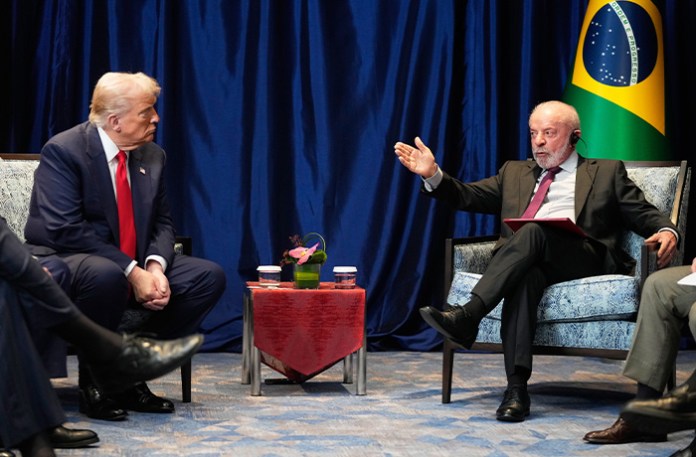
It was a couple of old guys talking about Ultimate Fighting, but it may have averted a crisis on two continents.
President Donald Trump met in Kuala Lumpur on Oct. 27 with his Brazilian counterpart, Luiz Inacio Lula da Silva. The two men, over the course of a few minutes in the Malaysian capital, made clear that months of tensions between these two political behemoths of the Americas were a thing of the past.
“Brazil, we’re going to make a deal,” Trump told reporters. “I think we’ll make a deal with Brazil; we get along very well.”
How well? Before the questions started, hot mics caught Trump praising a Brazilian export: ultimate fighters.
“Do you like the UFC?” Trump, 79, asked Lula, 80, leaning forward, referring to the Ultimate Fighting Championship, the pinnacle of mixed martial arts. “Do you like it? Brazil has great fighters.”
Trump loves UFC so much that he has invited its fighters to demonstrate their skills on the White House lawn next June to mark the United States’s 250th birthday.

What Lula answered is not audible, but Trump even bringing up his favorite sport was a signal of how comfortable he is with the leader he accused of threatening America’s economy and free speech traditions on July 30, imposing sanctions on top Brazilian officials and 50% tariffs.
Another thing Trump and Lula shared at the press availability on the sidelines of a summit of the Association of Southeast Asian Nations was contempt for the press. When Lula said the reporters were wasting his time, Trump grinned and said, “They’re not great questions today, they’re boring questions,” prompting Lula to laugh heartily.
After the meeting, Lula told reporters that not only would the tariffs be lifted, but there would be a trade deal “faster than anyone thinks.” Trump was less committal, but still positive: “I don’t know if anything’s going to happen, but we’ll see,” he told reporters on Air Force One.
How Brazil and the U.S. went from the brink of economic warfare to a budding bromance is a tale as ancient as European settlement in the Americas and as recent as the role of social media in our lives. It weaves in an American presidency driven by personal whims, emerging tensions among Trump’s advisers, and the systemic corruption that has infected every level of Brazil’s government.
If an alien were to obtain a world almanac and compare the two most populous countries in the Western Hemisphere, it would find much in common: both settled by Europeans who ravaged the indigenous populations, both resource-rich, both with massive land masses, and both slave states that have evolved into robust democracies.
“The U.S.-Brazil relationship is critical,” said Eric Jacobstein, a senior fellow at the Inter-American Dialogue, a think tank that promotes democratic values across the Americas.
“We’re talking about the two largest democracies in the Western Hemisphere, diverse countries, a shared approach on a number of issues,” said Jacobstein, who was a deputy assistant secretary in the State Department’s Bureau of Western Hemisphere Affairs during Joe Biden’s presidency.
“It is also a country with which the United States has a significant trade surplus,” Jacobstein said in an interview. “If you look at other countries throughout the world, when we’re talking about tariffs [Trump has imposed], you hear about [U.S.] trade deficits. We had a $6.8 billion trade surplus with Brazil last year.”
Brazil has a population of 212 million people, a land area slightly larger than the contiguous U.S., and a gross domestic product of $2.2 trillion or $10,214 per capita, according to an August report by the Congressional Research Service.
It also has a tortured history with the U.S.: Brazil was the only Latin American country to join the Allies in World War II. Its forces fought alongside U.S. troops in Italy. The late President Richard Nixon’s administration in the early 1970s worked undercover with the Brazilian military regime to undermine leftists in South America.
But there were also periods of tension. The junta resented the human rights focus of Jimmy Carter, who was elected president in 1976. Lula, for much of his first tenure in office from 2003 to 2011, had friendly if uneasy relations with the then-President George W. Bush administration. Lula’s insistence on maintaining ties with the late anti-American autocrat, Venezuelan President Hugo Chavez, stoked tensions.
More recently, Jair Bolsonaro, the right-wing populist who assumed office in 2019, got along famously with the similarly minded Trump during the last two years of the American president’s first term. In July 2019, Trump named Bolsonaro as a major non-NATO ally.
As president, Biden sustained and even bolstered the alliance with joint military exercises, but aggravated Bolsonaro by insisting on free and fair elections in 2022. And by backing Lula, the winner, against Bolsonaro’s claims that the elections were rigged.
It was the treatment of Bolsonaro that led Trump in July to jack up tariffs on the country to 50% from the blanket 10% tariffs he imposed on multiple countries during one of his administration’s tariff blitzes in April.
Trump’s order accused Lula’s government of “politically persecuting a former President of Brazil, which is contributing to the deliberate breakdown in the rule of law in Brazil, to politically motivated intimidation in that country, and to human rights abuses.”
Trump was piqued because Bolsonaro’s trajectory after losing the 2022 election was much like his own, another echo of the similarities in the U.S.-Brazil relationship. Just as Trump on Jan. 6, 2021, spurred an insurrection at the Capitol, Bolsonaro’s backers sacked government buildings in a bid to keep him in power, and at his behest, and the prosecution that Trump decried as a “persecution” was for that attempted coup. The July 30 order also imposed sanctions on Supreme Court Justice Alexandre de Moraes, who was presiding over Bolsonaro’s trial.
“These judicial actions, taken under the pretext of combatting ‘disinformation,’ ‘fake news,’ or ‘anti-democratic’ or ‘hateful’ content, endanger the economy of the United States by tyrannically and arbitrarily coercing United States companies to censor political speech,” Trump’s order said, referring to fines de Moraes imposed on X last year for not removing posts from Bolsonaro supporters. X is owned by Trump buddy Elon Musk.
The Treasury Department imposed the sanctions on de Moraes under the Magnitsky Act, a U.S. law aimed at major human rights abusers and named for an opponent to Russian President Vladimir Putin who died in prison after exposing corruption at the highest levels.
Bruno Brandao, the executive director of Transparency International Brazil, a nonprofit organization combating corruption, said Moraes and the Supreme Court were likely stretching the role of the Supreme Court by taking actions, such as sentencing Bolsonaro supporters who participated in the riots, that should be initiated by prosecutors.
Moraes is “doing courageous work, but also, in many instances, highly authoritarian, because he’s making secret decisions that are not public, ordering the shutdown of accounts and channels” on social media,” Brandao said. “Not content, not this post or that — but the whole account or the whole channel.”
Moraes was operating within a young and fragile constitution ratified in 1988 after years of autocratic rule, Brandao said, one that had failed so far to stem pervasive corruption in the country.
Lula himself served nearly two years in prison from 2018 to 2019 for his role in the all-encompassing car wash money laundering scandal, known as Operação Lava Jato. (It’s complicated, but think how Walter White’s car wash was used as a front in “Breaking Bad.”) Bolsonaro won the presidency in 2018 by campaigning on the alleged corruption of his opponents — and then promptly dismantled the corruption investigation apparatus that was closing in on the alleged dealings of himself and his family.
In that context, invoking the Magnitsky Act to sanction Moraes was a huge overreach, Brandao said.
“There is tons of evidence of the conspiracy, of the coup attempt,” Brandao said. “Bolsonaro is guilty, and his trial was full of evidence, and he should have been convicted as he was, and severely punished.”
The court convicted Bolsonaro last month and sentenced him to more than 27 years in prison, prompting fears among some Brazil experts that this would infuriate Trump and worsen relations.
“The U.S.-Brazil relationship has perhaps never been more tense — and the storm has not passed yet,” Valentina Sader and Ricardo Sennes, Brazil experts at the Atlantic Council, a foreign policy think tank, wrote after the conviction.
And yet the storm passed, less than two weeks later, in a 39-second encounter between Lula and Trump at the United Nations General Assembly. Trump said later he and Lula had “excellent chemistry.”
The meeting was engineered by Richard Grenell, a longtime Trump confidante, who has the vague title of Special Envoy for Special Missions and is also the president of the Kennedy Center, Washington’s premier arts venue.
It was a victory for Grenell, who, behind the scenes, has sought to rival Secretary of State Marco Rubio in shaping foreign policy. The tensions between Grenell and Rubio are not so much personal but reflect ideological differences between transactionalists like Grenell and old-style foreign policy hawks like Rubio.
Grenell believes in talking to as many parties as possible to secure deals and make his boss look good. He secured support from some Muslim Americans for Trump in last year’s election, saying he was likelier to end the Gaza war — a political coup considering Trump’s decidedly pro-Israel bent. He also brokered a tamping down of hostilities between Kosovo and Serbia in Trump’s first term.
Rubio and Grenell most sharply disagree on Venezuela. Grenell has for months sought to lower the temperature between the two countries, but Rubio’s hard-nosed approach has prevailed, and the U.S. and Venezuela appear to be verging on war.
In that light, Grenell’s coup seems all the more remarkable — Rubio, of Cuban American heritage, has little time for Latin American leftists such as Lula.
Brazil experts said Lula’s larger-than-life personality and his savvy reading of interlocutors were key to the meeting’s success.
“Lula learned from the other major leaders that have spoken to Trump that you butter him up, you kiss his ass, and that’s how you negotiate with the guy,” said Jason Steinbaum, who was chief of staff to former Rep. Eliot Engel when the New York Democrat chaired the House Western Hemisphere subcommittee. “You tell him he’s all important, all valuable, the beautiful, the biggest. And you start there, and you keep saying it over and over again, and suddenly you find you’re achieving your goals in negotiations.”
Joel Rubin, a former assistant deputy secretary of state in the Obama administration who liaised between the department and Congress, said Trump’s ego trumped ideological considerations. Lula, a socialist, won the same grace as Argentinean President Javier Milei, a libertarian, because they both figured out how to get along with the U.S. president. The Trump administration bailed out Argentina’s flailing economy last month to the tune of $40 billion.
“His measurement of bilateral relations is essentially about personal treatment of Trump,” Rubin said. “He had Bolsonaro as his top ally in Latin America for a number of years, and he replaced him with Milei — and now Lula has figured out how to work him.”
Bolsonaro is also increasingly looking like Trump’s least favorite creature, a loser, said Jacobstein of the Inter-American Dialogue. “If you look at Trump, this is a president who tends to cling to leaders whom he sees as strong and on the rise, which Bolsonaro is not. Bolsonaro lost his criminal case, and he’s becoming less relevant in Brazil.”
The sanctions and the tariffs also had the effect of rallying a deeply divided country around Lula, said the Atlantic Council’s Sader, who now says she is optimistic about the future of U.S.-Brazil relations. Bolsonaro’s base in rural areas surprised itself by rallying around Lula.
“A lot of the sectors that were hit were in the agribusiness sector,” she said in an interview. “You had the orange producers, you had the beef exporters. So I think that that was one of the issues that became problematic for Brazilians, including those that might have been supportive of Bolsonaro in the past.”
One effect of the episode could be to drive countries that have for years had close relations with the U.S. to work closely with one another, Brazil experts said, isolating the U.S. Nations may look askance at Trump’s sanctions, having to do with Brazil’s internal politics and not with a trade imbalance, especially in the case of a country like Brazil, where the trade imbalance is in the U.S.’s favor.
“Countries that value a market-oriented rules-based system may want to work together to counter U.S. bullying,” said James Wallar in an article on the Council on Foreign Relations website.
Trump could still extract a win, said Sader of the Atlantic Council: Lula could prove a useful intermediary with Venezuela, and Brazil is rich in resources that the U.S. could use, such as ethanol and minerals.
CALIFORNIA REPUBLICAN REP. KEVIN KILEY CALLS PROPOSITION 50 A ‘DIRECT ATTACK ON DEMOCRACY’
“It’s such a big, prominent country in the region, and I think that there is space for even more coordination, cooperation in the region,” she said. “Brazil can be a bigger ally to the U.S. in that sense, if you think about trade.”
One possible import in the immediate future: UFC fighters.
Ron Kampeas is an Arlington, Virginia-based journalist. He was JTA’s Washington bureau chief for more than 20 years, and previously reported for the Associated Press from the Jerusalem, New York, London, and Washington bureaus.



![[GOOD PRESS] ON[GOOD PRESS] ON](https://georgemagazine.com/wp-content/uploads/2024/08/16389056566437433941_2048-300x300.jpeg)
Discount Applied Successfully!
Your savings have been added to the cart.